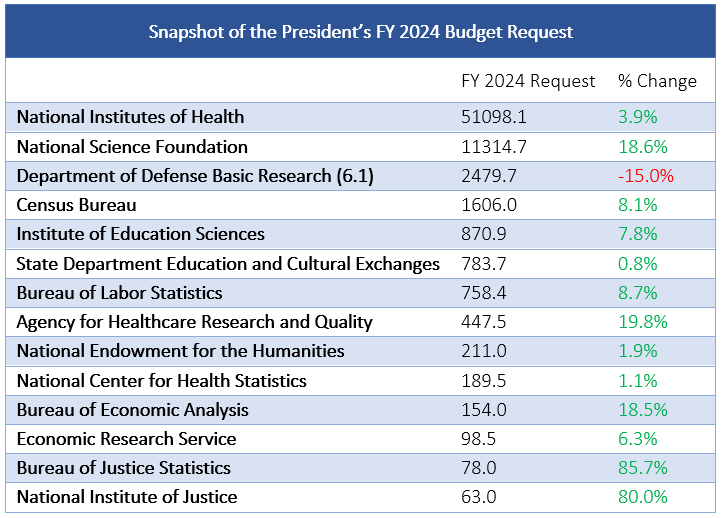COSSA Releases Analysis of President’s Budget Request for FY 2024 for Social Science
On March 9, the Biden Administration began releasing details of its fiscal year (FY) 2024 budget request to Congress, with additional information rolling out over subsequent days.
In total, the Biden Administration is requesting $209.7 billion for research and development activities across the federal government in FY 2024, an increase of $8.9 billion. Within that amount, $101.2 billion is sought for basic and applied research activities, an increase of $3.5 billion.
The budget identifies several cross-government priorities for the President, including:
- Cutting the cancer death rate by at least 50 percent over the next 25 years.
- Preparing for and preventing future pandemics.
- Combating climate change.
- Advancing national security and technological competitiveness.
- Broadening participation in science and applying science to achieve equity.
- Investing in STEM education and workforce.
As you will read throughout this report, the FY 2024 budget request prioritizes investment in these and other areas of central importance to the Biden Administration.

As always, when considering an Administration’s budget proposal, it is important to remember that it remains a largely symbolic policy document that outlines the Administration’s priorities for the year ahead. While it is possible that some of the President’s requests will be enacted, Congress has the final say over the appropriation of funds. The House and Senate Appropriations Committees will soon set their own spending parameters for each of the 12 annual appropriations bills, which may or may not be able to accommodate all the President’s prioritized investments.
The release of the FY 2024 budget request is the official kick-off of “appropriations season.” Congressional committees have begun their oversight hearings for departments and agencies under their purview featuring testimony by Biden Administration officials. House Appropriations Committees typically try to introduce and mark up their versions of the bills in late spring or early summer with the Senate often lagging several weeks behind. The start of the month-long August recess in which lawmakers return home to engage with constituents is a typical target for Appropriations Committees to complete their work on the bills and bring them to the floor for consideration.
However, as COSSA has been reporting, the new House Republican majority under the leadership of Speaker Kevin McCarthy (R-CA) is laser-focused on cutting spending for discretionary accounts. Calls in the House to reverse spending back to FY 2022 levels is all but certain to be met with fierce opposition in the Democrat-controlled Senate. The fight over funding is expected to come to a head over the summer as the U.S. approaches the debt limit and threatens to default on its obligations. Republicans are going to demand steep budget cuts in exchange for lifting the debt ceiling.
In addition, as we inch closer to the 2024 Presidential election, finding agreement on appropriations legislation will become all the more complicated. The research community should prepare for any and all scenarios to play out for FY 2024, including the possibility of a year-long continuing resolution that would maintain funding at FY 2023 levels (likely best case), or real cuts to discretionary funding (worst case).
COSSA will continue to report on the progress of FY 2024 funding legislation in the weeks and months ahead. In the meantime, we invite you to read on to learn about the President’s proposals as they pertain to social and behavioral science research.

